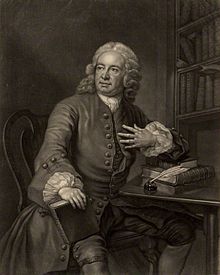Archibald Bower
| Archibald Bower | |
|---|---|
 |
|
| Born | 17 January 1686 Dundee, Scotland |
| Died | 3 September 1766 (aged 80) |
| Nationality | Scottish |
| Occupation | historian |
| Organization | Jesuit |
| Notable work | History of Rome (1735–44), History of the Popes (1748–66) |
Archibald Bower (17 January 1686 – 3 September 1766) was a Scottish historian, now noted for his complicated and varying religious faith, and the accounts he gave of it, now considered by scholars to lack credibility.
Educated at the Scots College, Douai, Bower became a Jesuit in Rome. He joined the Church of England a while after returning to London in 1726. He wrote a History of the Popes (1748–66, 7 volumes). This works was drawn into a damaging controversy, concerning his apparent return to the Jesuit or Catholic fold. By the end of his life it appeared he had changed religion three times.
He was born on 17 January 1686 at or near Dundee. In 1702 he was sent to the Scots College, Douai; he then went to Rome, and was admitted to the Society of Jesus on 9 December 1706. After a novitiate of two years he went in 1712 to Fano, where he taught classics till 1714, when he moved to Fermo. In 1717 he was recalled to Rome to study divinity in the Roman College, and in 1721 he was transferred to the college of Arezzo, where he remained till 1723, and became reader of philosophy. He was next sent to Florence, and the same year moved on to Macerata, where he stayed till 1726. By then he was, probably, professed of the four vows (his own statements concerning himself may not be reliable).
The turning-point in Bower's career was his transfer from Macerata to Perugia, and his departure from there to England in 1726. Jesuit records show that the Order sent him to England. Bower gave a quite different story in Answer to a Scurrilous Pamphlet (1757). Another account had been previously published by Richard Baron in 1750, allegedly based on the story Bower gave of his "escape" to Dr. Hill, chaplain to the archbishop of Canterbury. A third account is printed at the end of Bower and Tillemont compared (1757) by Douglas.
On his arrival in England in June or July 1726 Bower became acquainted with Edward Aspinwall, formerly a Jesuit, who introduced him to Samuel Clarke. After several meetings with Aspinwall, Clarke, and George Berkeley, he withdrew from the communion of the Roman Catholic church, and left the Society of Jesus. He wrote that he was then for six years a Protestant of no particular denomination, before l he conformed to the church of England. In fact he was making tentative contact again with the Jesuits, in the early 1630s.
...
Wikipedia
